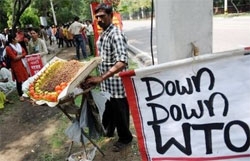2011 Doha trade deal in 'serious doubt': WTO chief
 |
| illustration photo |
"My frank assessment is that under the right conditions ... a deal would be doable ... but for NAMA, where the differences today are effectively blocking progress and putting into serious doubt the conclusion of the round this year," said Pascal Lamy, director general of the World Trade Organization.
NAMA or Non-agricultural Market Access refers to negotiations on tariff reductions for industrial goods which are in turn bound up with talks on agricultural produce, accounting for the bulk of the Doha Round talks.
"This is a grave situation for the round and for all of the efforts and aspirations it embodies," Lamy said in a note accompanying the latest set of negotiation texts published Thursday.
"It is our reality, however, and we must face it squarely in order to try to find a way forward together," he acknowledged.
Launched in 2001 in the Qatari capital, the Doha Round of trade talks have repeatedly missed deadlines as industrialised and developing nations fail to agree on the level of cuts to industrial good tariffs and agriculture subsidies.
In January, some political leaders repeated their call for the conclusion of the round in 2011, with British Prime Minister David Cameron warning that "we cannot go on after a decade with another year" of negotiations.
"If we come back and we're still talking about it, then I think that would be hopeless," Cameron said.
A key problem lies in proposals to subject specific industrial sectors to tariff cuts, or so-called sectoral negotiations.
Participation in sectorals is voluntary under the Doha mandate but developed countries such as the United States want emerging giants like China and India to sign up.
The United States is keen on gaining access to China's chemicals market but Beijing has refused to subject that entire sector to tariff cuts.
After holding one-on-one consultations with such key trading nations, Lamy said Thursday that "there is a fundamental gap in expectations in sectorals.
"This gap is not a technical one that one could bridge through adjustments in the architecture of sectorals," he noted.
"I believe we are confronted with a clear political gap which, as things stand, under the NAMA framework currently on the table, and from what I have heard in my consultations, is not bridgeable today," Lamy added.
The WTO chief urged the 153 member states of the trade body to "think hard about the consequences of throwing away ten years of solid multilateral work."
The full membership is scheduled to meet on April 29 to "begin our collective consideration of the next steps," added the WTO chief.
In Washington, US trade chief Ron Kirk reiterated Washington's commitment.
"We remain committed to finding a productive path forward in the Doha negotiations and believe that these new documents will help members look at the complete picture of where things stand," Kirk said, referring to the revised negotiation texts.
What the stars mean:
★ Poor ★ ★ Promising ★★★ Good ★★★★ Very good ★★★★★ Exceptional
Latest News
More News
- Russian President congratulates Vietnamese Party leader during phone talks (January 25, 2026 | 09:58)
- Worldwide congratulations underscore confidence in Vietnam’s 14th Party Congress (January 23, 2026 | 09:02)
- Political parties, organisations, int’l friends send congratulations to 14th National Party Congress (January 22, 2026 | 09:33)
- 14th National Party Congress: Japanese media highlight Vietnam’s growth targets (January 21, 2026 | 09:46)
- 14th National Party Congress: Driving force for Vietnam to continue renewal, innovation, breakthroughs (January 21, 2026 | 09:42)
- Vietnam remains spiritual support for progressive forces: Colombian party leader (January 21, 2026 | 08:00)
- Int'l media provides large coverage of 14th National Party Congress's first working day (January 20, 2026 | 09:09)
- Vietnamese firms win top honours at ASEAN Digital Awards (January 16, 2026 | 16:45)
- ASEAN Digital Ministers' Meeting opens in Hanoi (January 15, 2026 | 15:33)
- ASEAN economies move up the global chip value chain (December 09, 2025 | 13:32)
















 Mobile Version
Mobile Version